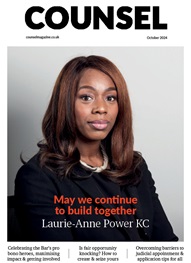*/
Pro bono
Sarah Hannett of Matrix Chambers has won the 17th annual Sydney Elland Goldsmith Bar Pro Bono Award, which was presented at this year’s Bar Conference.
Hannett’s City University Matrix School Exclusion Project, which she founded in 2011, provides pro bono representation to parents of children who have been permanently excluded from school and has so far assisted 47 families. Lord Goldsmith QC, Chairman of the judging panel, praised the barrister for her “innovative approach to supporting young people in need” and her encouragement and inspiration of other barristers and students to take part.
Special commendations also went to Robert Banks, sole practitioner and author of Banks on Sentence, who “this year alone” has dealt with over 200 requests for help from prisoners, often meeting them directly; and to Rachel Barnes of Three Raymond Buildings, who was commended for her pro bono work on a death penalty appeal and representation of four people, against whom the UN Security Council has applied financial sanctions for alleged associations with Al-Qaida.
The judging panel said it was “amazed by the unprecedented number of nominations”, which doubled from 16 in 2012 to 33 this year. Referrals to the Bar’s Pro Bono Unit, which runs the award, have also markedly increased. Since the introduction of LASPO the Unit has seen a 30% increase in caseload compared to 2012. “It is getting worse by the month,” its Chief Executive, Rebecca Wilkie, told Counsel. “In October there has been a 40% increase compared to 2012 and November is looking to be even higher.”
Special commendations also went to Robert Banks, sole practitioner and author of Banks on Sentence, who “this year alone” has dealt with over 200 requests for help from prisoners, often meeting them directly; and to Rachel Barnes of Three Raymond Buildings, who was commended for her pro bono work on a death penalty appeal and representation of four people, against whom the UN Security Council has applied financial sanctions for alleged associations with Al-Qaida.
The judging panel said it was “amazed by the unprecedented number of nominations”, which doubled from 16 in 2012 to 33 this year. Referrals to the Bar’s Pro Bono Unit, which runs the award, have also markedly increased. Since the introduction of LASPO the Unit has seen a 30% increase in caseload compared to 2012. “It is getting worse by the month,” its Chief Executive, Rebecca Wilkie, told Counsel. “In October there has been a 40% increase compared to 2012 and November is looking to be even higher.”
Pro bono
Sarah Hannett of Matrix Chambers has won the 17th annual Sydney Elland Goldsmith Bar Pro Bono Award, which was presented at this year’s Bar Conference.
Hannett’s City University Matrix School Exclusion Project, which she founded in 2011, provides pro bono representation to parents of children who have been permanently excluded from school and has so far assisted 47 families. Lord Goldsmith QC, Chairman of the judging panel, praised the barrister for her “innovative approach to supporting young people in need” and her encouragement and inspiration of other barristers and students to take part.


Our call for sufficient resources for the justice system and for the Bar to scrutinise the BSB’s latest consultation
Marie Law, Head of Toxicology at AlphaBiolabs, discusses alcohol testing for the Family Court
Louise Crush of Westgate Wealth explains how to make sure you are investing suitably, and in your long-term interests
In conversation with Matthew Bland, Lincoln’s Inn Library
Millicent Wild of 5 Essex Chambers describes her pupillage experience
Louise Crush of Westgate Wealth explores some key steps to take when starting out as a barrister in order to secure your financial future
From a traumatic formative education to exceptional criminal silk – Laurie-Anne Power KC talks about her path to the Bar, pursuit of equality and speaking out against discrimination (not just during Black History Month)
James Onalaja concludes his two-part opinion series
Expectations, experiences and survival tips – some of the things I wished I had known (or applied) when I was starting pupillage. By Chelsea Brooke-Ward
If you are in/about to start pupillage, you will soon be facing the pupillage stage assessment in professional ethics. Jane Hutton and Patrick Ryan outline exam format and tactics
In a two-part opinion series, James Onalaja considers the International Criminal Court Prosecutor’s requests for arrest warrants in the controversial Israel-Palestine situation